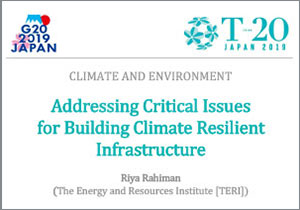G20: Aid developing economies to decarbonise hard-to-abate sectors
TERI's policy proposal on energy transitions to inform the discussions at G20 summit 2019

The 14th summit of the G20 countries takes place in Osaka, Japan on 28–29 June 2019. Leaders and Central Bank governors of around 19 nations and the European Union will gather to discuss various key issues related to global economy and finance.
Think20 (T20) – the research and policy advice network for the G20 – too is convening in Japan under its G20 presidency. Together, the world's leading think tanks will drive policy innovation to help G20 leaders address pressing global challenges and seek a sustainable, inclusive and resilient society.
TERI too has contributed three policy briefs for the T20 Task Force on Climate Change and Environment (2019), to contribute to and inform the discussions at G20. These include a policy brief on Energy Transitions.
Energy Transition in Emerging and Developing Countries: Promoting the New Paradigm
There is a new paradigm of energy transition emerging. In several important sectors, the transition is now endogenous, driven by the achieved or imminent competitiveness of low-carbon technologies. This is the case notably for the power sector, energy efficiency, and increasingly for segments of the personal transport sector. However, other sectors such as industry and heavy transport are lagging behind. These sectors are particularly relevant for developing countries, which have large unmet material and freight transport needs. The whole international policy environment needs to evolve to reflect the new paradigm. International funding, research, and demonstration needs to shift toward shifting the frontier of decarbonisation options into the hard to abate sectors.
To promote a new paradigm in energy transitions in emerging and developed countries, the policy brief recommends the following measures for G20 member countries:
- Announce a 2030 deployment and cost target for stationary storage and a related initiative to scale-up R&D in grid-scale energy storage
G20 countries should announce a stretch goal for stationary storage deployment in their power systems, in order to give a strong orientation to business strategists, researchers and innovators. At the same time, as part of Mission Innovation, the goal should be announced to raise the share of public R&D budgets going to storage substantially above current levels. - Announce a platform for low-carbon industry and goals for the deployment of pilot projects
Developed countries should drive the development and commercialization of new frontier technologies for lower carbon industry products. The G20 could play a facilitator role by announcing stretch objectives for the establishment of pilot projects, for e.g. alternatives to fossil fuels for the provision of high-grade process heat and hydrogen steel demonstration facilities. - Reallocate funding to assist developing countries in meeting the new paradigm
There is a need to reallocate funding to developing countries to enable them to meet energy targets. International funding has been crucial in de-risking and lowering the financing cost of the first generation of renewables deployment policies in developing countries. In India, low-cost international capital facilitates the cheap refinancing of renewables projects after several years of operations and proven cash flow.
See full policy brief below
You can also read the other policy briefs below:


 Resource Efficiency and Circular Economy
Resource Efficiency and Circular Economy  Building Climate Resilient Infrastructure
Building Climate Resilient Infrastructure